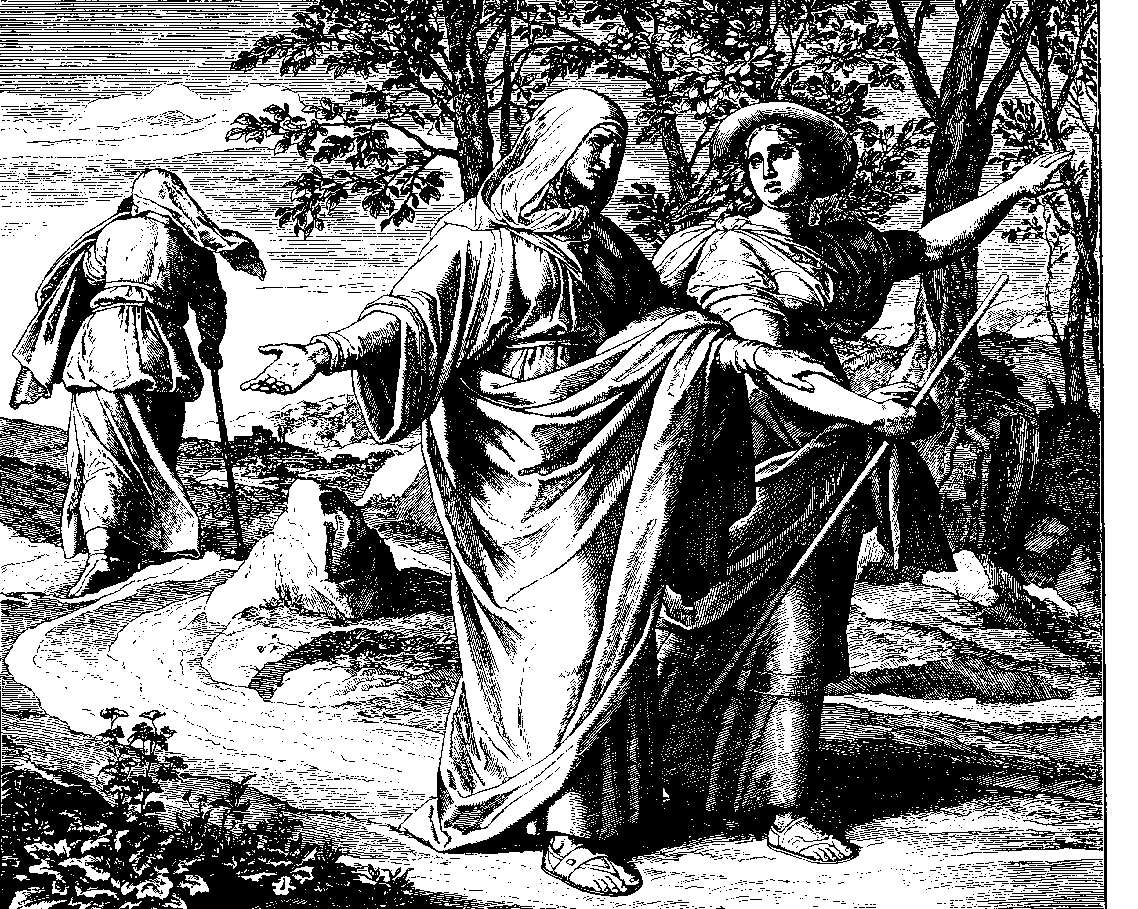Orpah on:
[Wikipedia]
[Google]
[Amazon]

 Orpah ( he, עָרְפָּה ''ʿOrpā'', meaning "neck" or "fawn") is a woman mentioned in the
Orpah ( he, עָרְפָּה ''ʿOrpā'', meaning "neck" or "fawn") is a woman mentioned in the Talmud Sanhedrin 95a
/ref>

 Orpah ( he, עָרְפָּה ''ʿOrpā'', meaning "neck" or "fawn") is a woman mentioned in the
Orpah ( he, עָרְפָּה ''ʿOrpā'', meaning "neck" or "fawn") is a woman mentioned in the Book of Ruth
The Book of Ruth ( he, מגילת רות, ''Megilath Ruth'', "the Scroll of Ruth", one of the Five Megillot) is included in the third division, or the Writings (Ketuvim), of the Hebrew Bible. In most Christian canons it is treated as one of th ...
in the Hebrew Bible
The Hebrew Bible or Tanakh (;"Tanach"
'' Moab Moab ''Mōáb''; Assyrian: 𒈬𒀪𒁀𒀀𒀀 ''Mu'abâ'', 𒈠𒀪𒁀𒀀𒀀 ''Ma'bâ'', 𒈠𒀪𒀊 ''Ma'ab''; Egyptian: 𓈗𓇋𓃀𓅱𓈉 ''Mū'ībū'', name=, group= () is the name of an ancient Levantine kingdom whose territ ...
and was the daughter-in-law of '' Moab Moab ''Mōáb''; Assyrian: 𒈬𒀪𒁀𒀀𒀀 ''Mu'abâ'', 𒈠𒀪𒁀𒀀𒀀 ''Ma'bâ'', 𒈠𒀪𒀊 ''Ma'ab''; Egyptian: 𓈗𓇋𓃀𓅱𓈉 ''Mū'ībū'', name=, group= () is the name of an ancient Levantine kingdom whose territ ...
Naomi
Naomi or Naomie may refer to:
People and biblical figures
* Naomi (given name), a female given name and a list of people with the name
* Naomi (biblical figure), Ruth's mother-in-law in the Old Testament Book of Ruth
* Naomi (Romanian singer) (bor ...
and wife of Chilion
Mahlon ( ''Maḥlōn'') and Chilion (כִּלְיוֹן ''Ḵilyōn'') were two brothers mentioned in the Book of Ruth. They were the sons of Elimelech of the tribe of Judah and his wife Naomi. Together with their parents, they settled in the land ...
. After the death of her husband, Orpah and her sister-in-law Ruth wished
to go to Judea
Judea or Judaea ( or ; from he, יהודה, Standard ''Yəhūda'', Tiberian ''Yehūḏā''; el, Ἰουδαία, ; la, Iūdaea) is an ancient, historic, Biblical Hebrew, contemporaneous Latin, and the modern-day name of the mountainous so ...
with Naomi. However, Naomi tried to persuade both Ruth and Orpah to return to their people and to their gods. Ruth chose to remain with Naomi, however, Orpah chose to return to her people and her gods. (Ruth i. 4 et seq.).
In rabbinic literature
Rabbinic literature, in its broadest sense, is the entire spectrum of rabbinic writings throughout Jewish history. However, the term often refers specifically to literature from the Talmudic era, as opposed to medieval and modern rabbinic w ...
, Orpah is identified with Herse, the mother of the four Philistine giants, one of whom was Goliath
Goliath ( ) ''Goləyāṯ''; ar, جُليات ''Ǧulyāt'' (Christian term) or (Quranic term). is a character in the Book of Samuel, described as a Philistine giant defeated by the young David in single combat. The story signified King Sau ...
. These four sons were said to have been given her for the four tears which she shed at parting with her mother-in-law (Babylonian Talmud, Sotah 42b). Her other name Harafa is cognate of the word for threshing
Threshing, or thrashing, is the process of loosening the edible part of grain (or other crop) from the straw to which it is attached. It is the step in grain preparation after reaping. Threshing does not remove the bran from the grain.
History ...
; that she allowed herself to be "threshed" by many men as one would thresh wheat (Babylonian Talmud, Sotah 42b).
The Sanhedrin
The Sanhedrin ( Hebrew and Aramaic: סַנְהֶדְרִין; Greek: , '' synedrion'', 'sitting together,' hence ' assembly' or 'council') was an assembly of either 23 or 71 elders (known as " rabbis" after the destruction of the Second Temp ...
tractate in the Talmud says that she was killed by King David
David (; , "beloved one") (traditional spelling), , ''Dāwūd''; grc-koi, Δαυΐδ, Dauíd; la, Davidus, David; gez , ዳዊት, ''Dawit''; xcl, Դաւիթ, ''Dawitʿ''; cu, Давíдъ, ''Davidŭ''; possibly meaning "beloved one". w ...
's general Abishai, the son of Zeruiah Zeruiah ( sometimes transliterated Tzruya or Zeruya) was a sister of King David. According to both and the Babylonian Talmud, Zeruiah was a daughter of Jesse and sister of Abigail, to whom reference is made in 1 Chronicles () and Samuel 2 (). Ze ...
, with her own spindle./ref>
References
{{Authority control Biblical figures in rabbinic literature Book of Ruth Moab People from Bethlehem Women in the Hebrew Bible Goliath